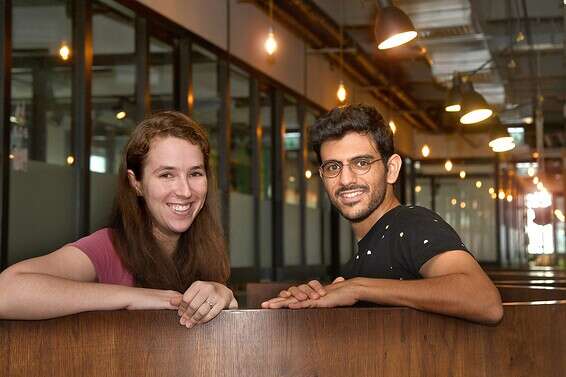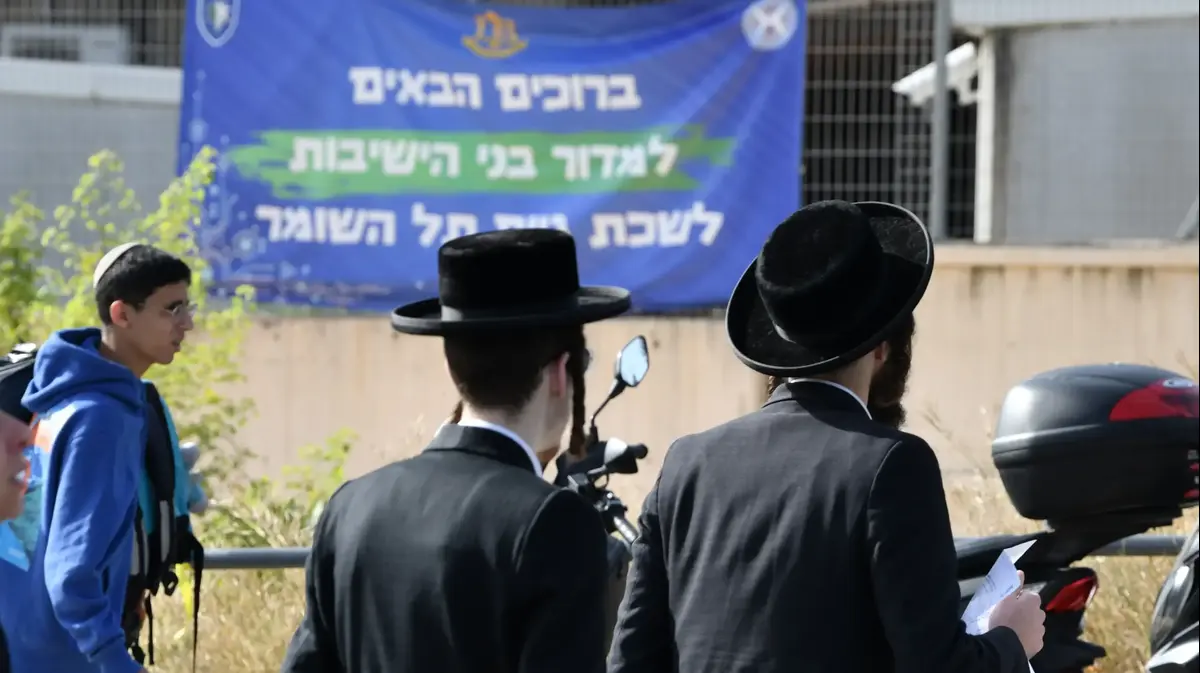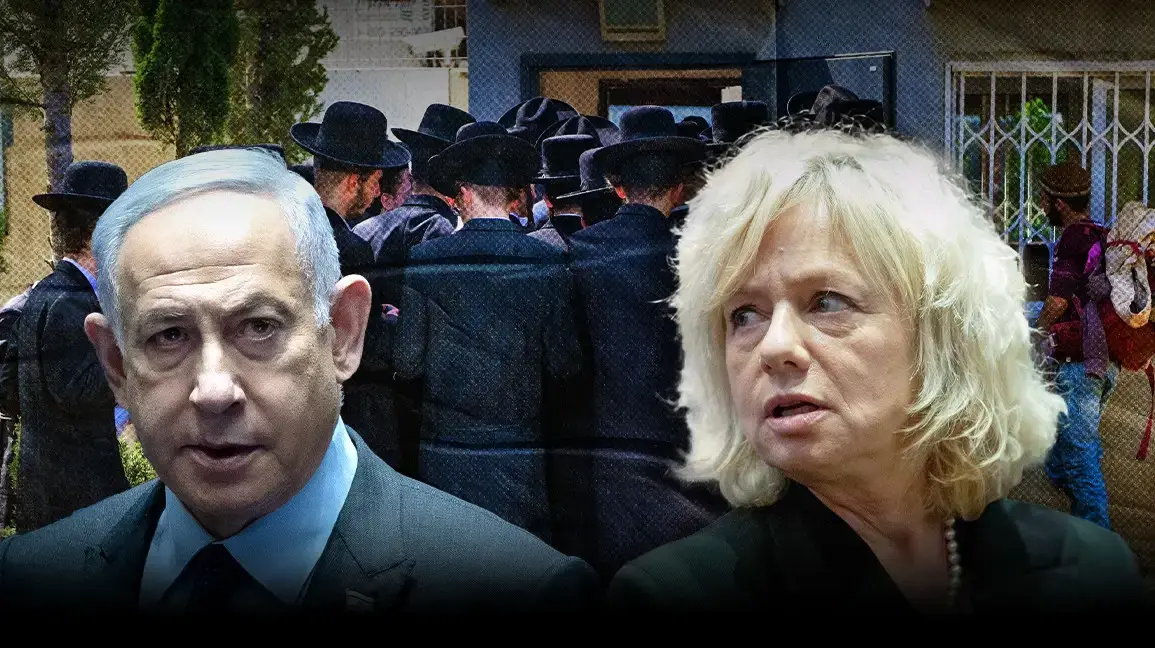"Your mind is rusty," the yeshiva director told Dan Leshem when he was 13, "so you ask questions." Alone, he owns a million-dollar startup
"I went through days and nights of loneliness and sadness, but I succeeded in everything."
Dan there, this week
Photography:
Efrat Eshel
Dan Leshem
can not forget
this moment
.
He was a 13-and-a-half-year-old ultra-Orthodox boy, a yeshiva student in Jerusalem, and the principal came down on him in front of the whole class.
"He told me, 'Your mind is rusty, so you ask questions,' and there was laughter in class. His statement was deeply etched in me. For many years I struggled with the feeling that I had to prove, to myself and the world, that I was not stupid. That my mind was not rusty."
Leshem was expelled from the yeshiva at the end of that year, and his record records only seven years of schooling.
But the "rusty mind" did not stop drilling, learning and advancing.
For two years he sat alone in the neighborhood library and learned computer programming from the books he read.
At the age of 16 he decided to go with the heart, left his ultra-Orthodox family and became secular.
Since then he has paved his way in life alone, with inexhaustible mental powers.
Today, at the age of 27 and without an academic degree, to the name of the director of a start-up company (Plantt), which recently raised a million dollars from investors in Israel and the United States. "I have great satisfaction from the path I chose," he says. Loneliness and sadness, but I managed everything.
"My path required me to be mature and independent and brought me to the good place I am."
He was born in the
Ramot
neighborhood
of Jerusalem, the youngest of five children.
From a young age he felt he was different.
That something deep inside is bubbling in him, and he cannot deny it.
"Ever since I can remember, I was a curious child," he says.
"A boy who asks questions and researches life all the time. I studied Torah in the neighborhood school until seventh grade, from there I went to study in a yeshiva in the Beit Vagan neighborhood, and there the questions began to burn in me in a way I could not resist.
" I began to be interested in things unrelated to the Torah agenda. And an internal crisis developed in me.
For example, in the story of creation we learned that on the first day it was so and so, and only on the fourth day did God create the luminaries, to differentiate between day and night.
I caught myself and wondered how it could not have happened already on the first day, but only on the fourth.
"They did not like it. It angered them that I even doubted anything that was so neat and clear. They stopped letting me attend classes and ask questions. It was the stage where the principal embarrassed me in front of the whole class. It hurt me. Even when I graduated five years ago with honors. "A. In the mathematics department at the Open University, I said to myself, could it be that I'm still rusty? It stays with me all the time. But maybe there's something good about it, that always reminds me of where I was, and what I ran forward with."
There he went through a complex process.
He experiences a great crisis of confidence in the face of religion, with the constant burning in him the knowledge that he wants another life.
Two months after the bar mitzvah he stopped putting on tefillin, and occasionally would also take off the dome.
"I knew I wanted to honor my parents and the family, but I also knew I was somewhere else and had to discover my way in the world. But it was not black and white. I loved the Kiddush on Saturday night, the songs and ceremonies that connect the family. I loved reading Psalms in the synagogue. "On Shabbat, and I liked to go on Saturday evenings from the neighborhood to the Western Wall, which is an hour's walk away. The seculars went to play tennis, we went to read Psalms. Even when I had questions about the Torah world, I loved the ceremonies, the Western Wall and the synagogues.
Did you share with your parents or anyone else what you are going through?
"I did not share the parents. I left it to myself. At the end of the year the yeshiva director threw me away. I guess it was because I asked too many questions. He called my parents and me, we had a conversation, and he said I was 'not suited to the social climate.' , And that there might be a framework that would suit me better.
"My parents took it seriously.
I knew I was not disturbed and I was not naughty.
I did not run away from school or do anything forbidden.
I did the chores and I was fine.
"I actually did not regret leaving. I realized that this is an opportunity for me to invest in things that really interest me."
what things?
"For example, I was very curious to know what a computer is. How it works, what is in it. There were some computers in the yeshiva, but we did not have access to them. When I could, I would splurge and deal with computers there. Understand what a power supply is and research the computer and try to understand it .
"we had no home computer.
I knew there were computers in the neighborhood library, so I went there, even when I was sitting, and I would sit there on the computers.
Well, Bendit. "
His parents tried to move
him to another meeting.
For two years he was taken to meetings in Jerusalem, but he did his best not to be accepted by anyone.
"There were exams and interviews - for example, they let me read a Gemara passage and tested me on it - and I really made no effort to succeed. I realized I wanted a different setting in my life. It was not that I walked the streets idle and smoked cigarettes. I was a skinny kid with asthma, To be in the library. "
There, in the neighborhood library in Ramot, he discovered a new and fascinating world there, which agitated him.
"For two years I would get up in the morning and go to the library. I found a thick book on programming there and started solving exercises, without having a clue what I was doing. There were also accessible computers, with which I started building websites."
Did your parents know you were going to the library?
"I do not think they were preoccupied with it. They were in their daily routine, and it is not spoken at home. They knew I was not sitting, but my father was busy from morning to night in his work as a shuttle driver, and mother was also in work in the mornings, she was a teacher.
" The Harry Potter books have conquered the world.
I read them in the library and set up a Harry Potter website with a friend I met online, which was a resounding success and soon became Harry Potter's most popular fan site in Israel.
Thousands of users logged in every month.
There were advertisements in it, from which I earned a few thousand shekels a month, something like 3,000 or 4,000 shekels, and from that money I bought myself a laptop and programming books.
"I put the computer at home, I did not hide it. We are a Spanish family, it was not a house of devout storks from Mea Shearim. On the other hand, my parents did not like it, and it was part of the disagreements and quarrels between us, they were not happy I chose this way. Take me for interviews at meetings and keep asking me 'what will happen in the end'.
"At the age of 15, when I had already accumulated several thousand shekels, I went to the bank and opened an account for myself.
My parents agreed to sign for me in front of the bank.
But bottom line, after a lot of quarrels, I knew I had to get out of the house.
That the path I chose does not suit the house where I grew up. "
Even today it is not easy for
him to talk about it, and he constantly emphasizes how much he respects his parents and their way of life.
Around the age of 16, after three years without a school, he left home and slept with members of the LEAD organization for the development of young leadership in Israel.
"At the age of 15, I read about the organization on the Internet and asked to join them. I was accepted. They did not know then that I left the house, I only told it later. Then the organization found me a rented apartment with three partners, in central Jerusalem. They were national-religious, 27 years old. , Very open, liberal, some did a master's degree then. They did not care what I do in my private space. In the public space we always respected each other, we did a Friday meal and kiddush together. To this day they are the people closest to me, kind of big brothers. They were with me at my canopy, and one of them performed the religious ceremony at the wedding. "
And yet, leaving home at 16 is not easy.
"I will not lie to you, these were difficult years. Years of loneliness, of self-search, of identity formation. I spent whole nights lying in bed crying. I also had to make a living, so I did not have much time to deal with philosophical matters. I started working on building websites and developing Software for friendships. My luck, and it's huge luck, was that I met a lot of people who supported me in the difficult moments.
"Around the age of 17 I tried to reconnect with the family, but my parents did not want to.
They said to me, 'If this is the way you have chosen - it does not fit.' "
Did you have moments of remorse?
" There were, and still are today.
I asked myself where I came from, and I did not always have answers.
I did not know if my path was right, but I knew I did not want my previous life.
How can I convince myself that I believe in God when I do not?
"At the age of 17 I started going to a psychologist. I financed the treatment myself. It was not easy, but it was very important to me. On the one hand I learned to manage on my own, and on the other hand I learned to trust others and ask for help.
" further.
I found a job as a programmer at a high-tech company in Tel Aviv, and every day I would travel by bus to Tel Aviv and return home in the evening.
But I did not let anything stop me.
There was something forging, building in it.
"I spend a lot of time self-criticizing and constantly checking to see if I could have done things differently. In the end, I'm happy about how things worked out for me in life."
The recruitment was not easy either.
"I came to the army after seven years of schooling, so my enlistment data was like that of a youth at risk. I was considered a lone soldier. In the enlistment bureau I was told 'what do we do with you?', And I was assigned to be an armored mechanic. Than a grease and a 5-pound hammer. It burned in me to give as much as possible.
"Prior to the recruitment, I prepared my portfolio as a programmer, and wrote a letter of request for another position.
With that I went to the BKOM. I stood in the conscription chain and looked for the officer with the most falafels on his shoulder. I found him, approached him, gave him the letter and asked him to look in my portfolio.
"It was the deputy commander of the BKOM. He decided to take me "And he put me in a recruiting selection team. I was a kind of analyst there, I did research of sorting and placement - how to place each recruitment cycle."
During his military service, he rented a small apartment in Kiryat Ono with another soldier and two discharged soldiers.
The army financed part of his rent.
"My commander understood the situation and let me work, so during the service I did programming projects for high-tech companies. That's how I managed to survive."
After his release, he changed his last name to Leshem ("I wanted a fresh start, and the name change symbolized it") and again rented an apartment with partners in Jerusalem.
"I set myself the goal of studying computer science, but I realized that I do not even know how to solve an equation with one missing person. Arnon, my close friend and partner in the first apartment, was a statistician, and he taught me the basics of the basics, from the most fundamental level. "Great passion. I decided I wanted to study mathematics at all and I enrolled in the Open University."
At the same time, he started working for the startup "Smartbass", which deals with shuttle sharing.
"And who hired me? Who examined me? My future wife!"
He says enthusiastically.
"She interviewed me, recommended accepting me, and at first was even my principal."
His wife, Lee (26), nods with a smile.
She served in 8200, and upon her release joined the company as a programmer and team leader.
"After about half a year, we were looking for someone to lead the development team with me," she says.
"One of the candidates I interviewed was Dan. I remember from the first moment he had something else in him: his formulation, his knowledge. He knew how to give all the right answers.
" Dan started working on my team, along with ten other employees.
He has great interpersonal skills, and we had some very interesting conversations about work and life in general.
At breaks I tore it up in ping pong.
"At the time I had a partner, and Dan also had a girlfriend, his first girlfriend. After half a year, in 2016, we were both already after breakups. And Dan, like Dan, asked me one Thursday, 'How about going out with me?'
I told him, ‘Let me think about it.’
”All weekend I was in movies with myself.
I said, he's a good friend, colleague, why take this to places we might regret?
But then a good friend said to me, 'If you're so busy, this is a sign that it interests you.
"On Sunday, during the lunch break, I said to Dan, 'You know what? There's no reason not to go out.' It took us a week to find a free evening for both of us, but in the end we went out to a movie. Since then we're together."
Four years ago they left "Smartbass" together and went on a three-month trip to Europe.
"It was my first time abroad," says Dan. "We had a wonderful trip.
We started in Italy, continued to France, Germany and Slovenia, all on buses, with a low budget and a lot of enthusiasm.
I also continued to work during the trip, I had a laptop and gave advice to startups. "
Upon their return to Israel
, Dan joined Orcam, a company that manufactures a computer-based vision device that helps the visually impaired, the blind and others with additional disabilities.
Lee began studying economics and computer science at the Open University and worked for a start-up company that has since closed.
Dan: "At Orkam, I set up two application development teams and led them for two years. There I met Itamar Isaac, who managed the second team. We had a good connection from the first moment. At a certain point, we started rolling out the idea of starting a new company together."
A year ago they made the dream come true.
The company they founded, Plantt, is a technology company that uses artificial intelligence to collect companies' communications with customers via phone calls, emails, Facebook or WhatsApp, analyzes it and points out points where customers were not satisfied.
"Our system actually builds an automated call dialogue, which knows how to give answers and relevant information to customers in a variety of channels. Our technology is unique in that artificial intelligence knows how to learn from mistakes and conversations made with customers, identify the most sensitive issues and respond to what the customer needs. For example. Who needs help improving the password, who has lost a credit card or who wants to disconnect from a particular company, in 90-80 percent of cases it will be able to solve the problem in a written chat, without human intervention.
"The process significantly reduces the stress and strain on the technical support team and customer service, changes the customer experience and also saves companies that use it about 45 percent of personnel expenses in these areas. The system also analyzes for the company the recurring problems and improves service."
Plantt recently raised $ 1 million from venture capital funds in Israel and the United States, and is already preparing to raise additional capital. Leshem and Isaac currently employ ten people, including Lee, who works as a product manager, characterizes the features and works with programmers. "I am very pleased that we work together." , Smiling there, "We have a fruitful cooperation, and it only adds to the company.
To me, it's really the left lobe of my brain. "
Dan and I got married
a year and a half ago.
They live in an apartment in Tel Aviv, and "are busy with our baby, which is the business. That's what wakes us up at night."
The boy who made a change in his life, while leveling his way alone, and with great courage, believes he is in the right place in his life.
"I know that what I went through in life has strengthened me, forced me to take responsibility for my life at a young age and think differently. I am now investing this independence in my business. The fact that I have my own company gives me new energies and a desire to develop and grow more."
Do your parents know where you are?
"I think so. We have mutual respect, and everyone in his life. I have an uncle, my mother's brother, with whom I am in occasional contact. I am very busy building my own family, and even though we are talking about a path and success, I am still paving it, "Like I did all my life. I have not yet reached the stage where I take the backrest back."
erannavon9@gmail.com














